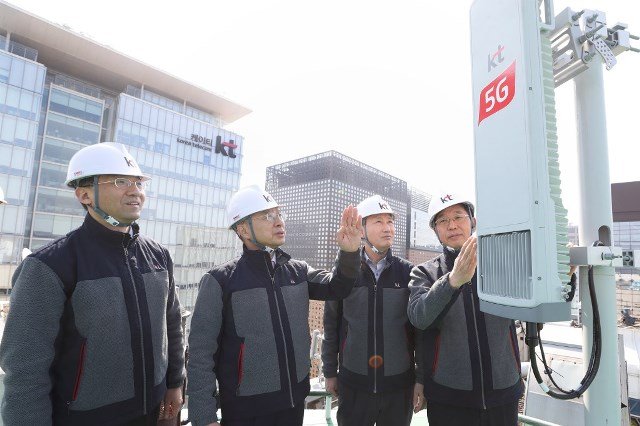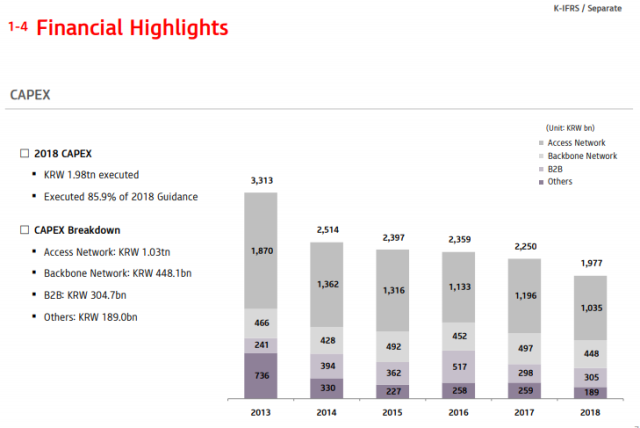KT has revealed its 5G network plans and monetization strategies to ensure that the company is leading the 5G market in Korea.

5G network
KT’s network management team including Sung-Mok Oh, president; Chang-Seok Seo, vice president; and Jin-ho Choi, vice president are driving the 5G business strategy.
Sweden-based Ericsson and Korea-based Samsung are the 5G network partners of KT during this transformation journey. Ericsson earlier also assisted KT during the deployment of its 4G LTE network. Huawei, ZTE and Nokia did not win the KT contract.
KT is following its “5G First” strategy to focus on providing the best network, low latency and 25 percent cut in smartphone battery use.
KT and Samsung achieved 1Gbps speed with Galaxy S10 5G smartphone on KT’s network, using 3.5 GHz frequency in downtown Seoul on March 26.
Ericsson is providing 3GPP standards-based 5G new Radio (NR) hardware and software from its 5G platform to cover KT’s 3.5 GHz Non-Standalone network.
Jinho Choi, vice president, Access Network Design, KT, said: “By taking a global lead to enable 5G services through 5G smartphones, KT is demonstrating our commitment to our customers how we can drive a global 5G ecosystem.”
KT, which launched 5G network for enterprise customers in December 2018, offered the first 5G smartphone from Samsung Electronics — Galaxy S10 5G – to its retail customers on April 3.
KT Chairman Hwang Chang-Gyu has ensured that KT is the first mobile operator to offer unlimited data plans for its 5G customers.
“We will become the number one operator of the intelligent platform, delivering the first and best 5G network services throughout South Korea,” Hwang Chang-Gyu said.
KT’s Capex for 2018 indicates that the telecom operator did not enhance its investment in 2018 despite its 5G drive.

KT deployed the first phase of its commercial 5G network across South Korea in November 2018. The service primarily covers most populated areas, including the capital Seoul and its surrounding metropolitan area, six other metropolitan cities, most of all 85 major cities, 70 shopping malls and discount stores and 464 college campuses.
KT’s engineers have built its commercial 5G network to cover key transportation routes, including two highways, six airports, and the ground section of high-speed railways. KT plans to expand the coverage to subways and key sites such as public offices and university hospitals.
KT operates mobile edge computing (MEC) telecom centers in eight cities to support 5G’s ultra-low latency. The investment in a number of MEC centers will enable KT to process data from handsets closest by to enable more reliable and seamless transmission.
KT 5G data plans
KT is offering 5G Super Plans in three packages: Basic (80,000 won per month), Special (100,000 won per month) and Premium (130,000 won per month), each offering unlimited roaming services in 185 countries.
Customers can receive a 25 percent discount to join these Super Plans on a 2-year contract and an extra 25 percent off by signing up with a family member.
Light data users can subscribe to 5G slim, which caps speed at 1Mbps after 8GB of data for 55,000 won per month.
KT content focus
KT plans to focus on eight services in the three categories of content: communications, games and media. All eight services include: narle, Real 360, eSports Live, Streaming Games, Real Genie Pack, GiGA Live TV, Pro Baseball Live and Musician Live.
Lee Pil-Jae, head of KT’s Marketing Group, said: “We will continue our efforts to lead 5G innovations with the world’s best network and services in partnership with our global partners.”
Strategy Analytics said Korean mobile operators’ strong focus on differentiated 5G content services will be critical in building demand: this will be less about finding a killer app and more about offering a range of content.
All operators in Korea is excited about the commitment of the South Korean government that pledged this week to support the completion of the nationwide 5G network by 2022 and raise more than 30 trillion won to invest in the 5G ecosystem.
Baburajan K





